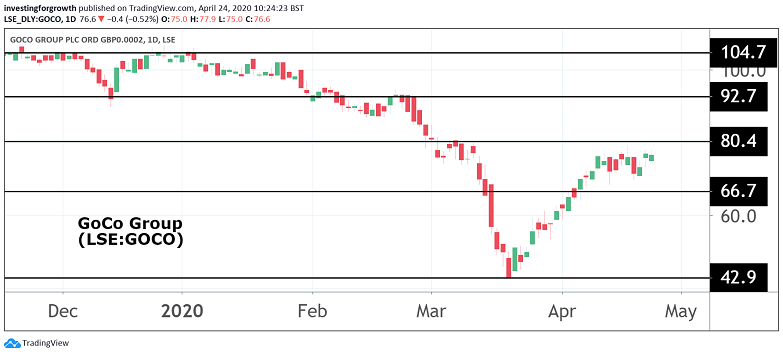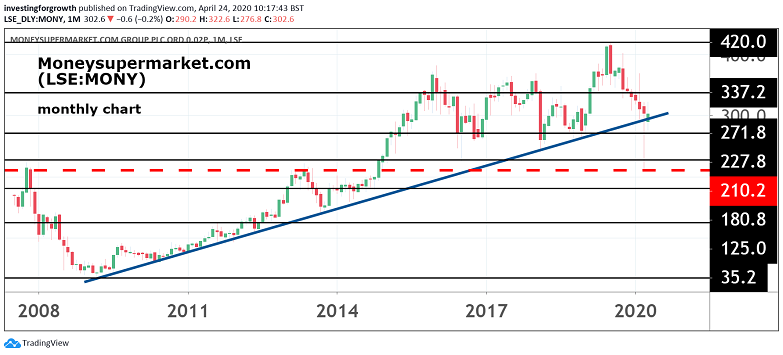Stockwatch: is this industry dependable for dividend yield?
A core holding for some income funds, we discuss whether you should rely on these ‘low-risk payouts’.
24th April 2020 10:31
by Edmond Jackson from interactive investor
A core holding for some income funds, we discuss whether you should rely on these ‘low-risk payouts’.

Two more stocks make for interesting comparison; companies whose cash generative qualities mean they have accumulated enough to at least pay final dividends in respect of 2019, despite suspending profit forecasts. As “intellectual property” type businesses, they are not calling on taxpayers to furlough employees, inviting controversy like we see around building materials group CRH (LSE:CRH).
Small-cap firm GoCo (LSE:GOCO) – formerly “GoCompare” – and much larger rival Moneysupermarket.com (LSE:MONY), are classic price comparison websites posting broadly resilient updates recently. Both should benefit from a social environment of higher unemployment and value-for-money searches, especially now that we are told social distancing will have to continue for much longer.
It is why their stocks rebounded smartly from the market’s shock-induced lows in March, although it does also look like their established turf of car and travel insurance will be slow to recover, possibly staying below historic levels.
Prior to the pandemic there had also been doubts about whether the best years for price comparison websites were over, both stocks having traded volatile-sideways over the last five years, Moneysupermarket priced for a 4-5% yield and Goco sub-2%.
The rationale for holding Goco has involved new attempts for growth such as voucher codes, plus occasional speculation about a private equity takeover bid.
Mixed performance and takeover attraction for Goco
Even before the pandemic, Goco shares were drifting lower from over 100p in the New Year, having been as high as 138p in July 2018. They eventually hit 43p mid-March but have recovered to 77p, a level where they also trade in September 2019.
After a 50% fall in 2019 earnings, chiefly due to investment in its AutoSave service, consensus has been for net profit to rebound to a £20 million range this year and next, similarly earnings per share (EPS) from 3.5p to 5.3p then 7p, and dividend per share back to 1.4p or so, as paid three years ago (see table below).

Source: TradingView Past performance is not a guide to future performance
You’ll excuse my applying a broad brush when management itself has withdrawn forecasts, but, assuming EPS of roughly 4p implies a price/earnings (PE) ratio in the high teens – i.e. anticipating longer-term recovery – and that the dividend is held at around 0.9p (in uncertain times), this implies a yield of only 1.2%. This appears to show how market sentiment has improved and that Goco shares haven’t fallen between these two stools.
A 21 April update has majored on the group expecting to generate positive operational cashflow “even under multiple stress scenarios”, with £27.4 million cash at end-March. Liquidity is also supported by £22 million scope from a bank facility renewed last October. The 2019 cash flow statement showed dividends costing £5 million in context of £21.9 million net cash generated from operations.
| Goco - financial summary | ||||||
|---|---|---|---|---|---|---|
| year end 31 Dec | 2014 | 2015 | 2016 | 2017 | 2018 | 2019 |
| Turnover (£ million) | 113 | 119 | 142 | 149 | 153 | 152 |
| Operating margin (%) | 22.6 | 19.4 | 15.4 | 22.1 | 24.6 | 13.3 |
| Operating profit (£m) | 25.6 | 23.1 | 21.9 | 33.0 | 37.5 | 20.3 |
| Net profit (£m) | 20.3 | 19.1 | 15.8 | 24.4 | 27.0 | 12.7 |
| EPS - reported (p) | 4.9 | 4.6 | 3.8 | 5.7 | 6.3 | 3.0 |
| EPS - normalised (p) | 4.9 | 4.6 | 5.2 | 5.9 | 7.1 | 3.5 |
| Price/earnings ratio (x) | 22.0 | |||||
| Operating cashflow/share (p) | 4.7 | 4.5 | 6.7 | 5.9 | 8.3 | 5.1 |
| Capital expenditure/share (p) | 0.3 | 0.3 | 0.3 | 0.5 | 1.9 | 2.3 |
| Free cashflow/share (p) | 4.4 | 4.2 | 6.4 | 5.4 | 6.4 | 2.8 |
| Dividends per share (p) | 1.4 | 1.6 | 0.9 | |||
| Yield (%) | 1.2 | |||||
| Covered by earnings (x) | 4.1 | 4.0 | 3.3 | |||
| Cash (£m) | 36.2 | 4.3 | 18.4 | 24.5 | 11.9 | 11.4 |
| Net debt (£m) | -36.2 | -4.3 | 54.7 | 39.3 | 67.5 | 76.0 |
| Net assets (£m) | 41.5 | 11.2 | -58.6 | -34.1 | -12.0 | -6.4 |
| Net assets per share (p) | 9.9 | 2.7 | -14.0 | -8.2 | -2.9 | -1.5 |
| Source: historic Company REFS and company accounts |
Yet the update cites a slower environment for price comparison by way of reduced search items across UK financial services – versus social media activity, for example, and some people have let car insurance policies expire.
DVLA SWORN data shows the number of cars officially off-road having doubled since February, and quotes for buying cars and driving tests have fallen. Car insurance has shown 4% like-for-like growth for the first quarter 2020, albeit accelerating from end-2019, then “some short-term impact” lately.
One would assume home insurance should be resilient and offer good scope for price comparison, though isn’t clarified. Travel insurance demand grew heavily in March, then slumped at the month-end and has been withdrawn lest it “doesn’t fully meet all their needs” – as if less than sufficient in the circumstances.
More positively, AutoSave, a service which automatically switches subscribed customers to the cheapest provider, has enjoyed 25% growth since end-2019 – for first quarter revenue of £4.2 million or 10% of the total. AutoSave is said to be on track to grow customers by at least 49% by end-June, from 300,000 at end-2019. It’s a small but bright spot alongside £36.1 million revenue from price comparison and £1.2 million from rewards.
A free £250 excess with insurance bought is cited as a driver, although it didn’t convince me when I compared the market via Goco to renew my car insurance last month; and there are consumer allegations online about how this isn’t honoured when making a claim.
The rewards side is said to have performed well, but it appears prospects have de-rated as various industries ceased marketing. “Trading has recovered somewhat but remains impacted by availability of supply.”
So it’s a mixed bag. I like an agency-type business’s ability to earn a healthy return on capital – Goco’s has been around 25% - which could improve if AutoSave continues to attract business. Capitalised at just over £300 million, Goco could therefore attract private equity interest for times when price comparison activities improve. Meanwhile, its cash generation would support/pay down extra debt instead of paying out dividends. Despite the rebound, a Hold stance is fair.
Are insurers backing off from aggressive premium rises?
It’s a potentially bearish development to watch for, if very early days to be sure. Price comparison websites appear to have prospered significantly due to insurers’ annoying habit of racking up renewal prices – hoping customers won’t bother to challenge them, thus helping subsidise first-year discounts (to get people to switch).
Eventually, regulators have criticised this, and Saga (LSE:SAGA) has claimed success at introducing three-year fixed-price premiums – suggesting a sea-change might be underway.
My recent experience is just one example but supports this hunch. For a first year I found a Goco search struggled to beat renewing my car insurance, which only went up a few per cent instead of 20% typically (by whoever). I opted to stay despite Goco’s offer of £250 free excess. It’s hardly a death-knell but potentially a material loss of revenue the sites would need to substitute.
Is a 4% yield redeeming enough for Moneysupermarket.com?
This stock was a strong performer in the aftermath of the 2008 crisis, rising from about 50p in April 2009 over 350p by April 2016 – only then to establish a volatile sideways trend as EPS growth has tempered relentlessly from 35% in 2014 to a decline of 6% last year.
I suggested buying the shares from 145p in October 2013, switching to “sell” at 340p in July 2017 when a PE multiple of 25 seemed rich for an industry consolidating. I was concerned that the stock market could de-rate Moneysupermarket further – to exact a more meaningful yield – and its volatility certainly increased, down near 250p in February 2018 then back up near 420p last July.
Yet, I’ve also noticed it mentioned as a core holding for income funds, as if they were persuaded by a sense of low-risk payouts and special dividends. The price is currently 303p, up from 227p in March.

Source: TradingView Past performance is not a guide to future performance
Similarly to Goco, on 2 April the company declared mixed trading for the first quarter of 2020 - 2% revenue growth, within which insurance showed 8% growth albeit money, home services and other revenue eased by low single digit percentages.
The casualty appears to be money where trading dynamics fell in March, although I sense that may be the “shock to the system” which could improve. Attractive offers from energy providers sustained homes services trading, but travel-related business weakened significantly from mid-February.
Net cash at end-March was around £30 million versus last year’s cashflow statement showing £100 million going out as dividends.
That did include a 7.5p special dividend besides a prior year 8.1p final dividend and 3.1p interim dividend. Maintaining an 11.7p per share payout implies nearly £63 million required, in context of £113.7 million net cash generated last year versus £17.3 million investment.
| Moneysupermarket.com - financial summary | ||||||
|---|---|---|---|---|---|---|
| year-end 31 Dec | 2014 | 2015 | 2016 | 2017 | 2018 | 2019 |
| Turnover (£ million) | 248.0 | 282.0 | 316.0 | 330.0 | 356.0 | 388.0 |
| Operating margin (%) | 25.7 | 28.6 | 28.8 | 28.8 | 30.4 | 30.5 |
| Operating profit (£m) | 63.9 | 80.5 | 91.2 | 94.9 | 108 | 118 |
| Net profit (£m) | 52.8 | 63.4 | 73.5 | 78.1 | 86.6 | 94.9 |
| EPS - reported (p) | 9.6 | 11.6 | 13.4 | 14.4 | 16.1 | 17.7 |
| EPS - normalised (p) | 10.2 | 12.3 | 13.7 | 15.8 | 17.0 | 18.0 |
| Price/earnings ratio (x) | 16.8 | |||||
| Operating cashflow/share (p) | 15.3 | 17.6 | 19.3 | 19.6 | 19.8 | 21.2 |
| Capital expenditure/share (p) | 2.1 | 4.1 | 4.1 | 3.9 | 3.6 | 2.8 |
| Free cashflow/share (p) | 13.2 | 13.5 | 15.2 | 15.7 | 16.2 | 18.4 |
| Dividends per share (p) | 8.0 | 9.2 | 9.9 | 10.4 | 11.1 | 11.7 |
| Yield (%) | 3.9 | |||||
| Covered by earnings (x) | 1.2 | 1.3 | 1.4 | 1.4 | 1.5 | 1.5 |
| Cash (£m) | 43.1 | 16.7 | 44.6 | 35.1 | 44.8 | 24.2 |
| Net debt (£m) | -13.2 | -16.7 | -44.6 | -35.1 | -29.8 | 10.2 |
| Net assets (£m) | 148 | 166 | 186 | 170 | 201 | 199 |
| Net assets per share (p) | 27.2 | 30.4 | 34.1 | 31.8 | 37.4 | 37.1 |
| Source: historic Company REFS and company accounts |
So it currently appears that the ordinary dividend ought to hold, supported also by a £100 million debt facility. Mind the company statement is carefully worded, saying that while an 8.6p final dividend payout won’t jeopardise ability to invest and support operations, the board “will keep dividend policy for the rest of the year under review.”
This leaves Moneysupermarket’s status as a low-risk income stock in question, it being quite at the mercy of consumer trends, where the current view is blurred between some areas of business doing well and others being compromised, with little sense how lockdown and its aftermath might evolve.
My sense is that the group will navigate through the next 12-18 months shorn of special dividends. The crux is the extent to which cash generation then rebuilds. Broadly, and if you already do: Hold.
Edmond Jackson is a freelance contributor and not a direct employee of interactive investor.
These articles are provided for information purposes only. Occasionally, an opinion about whether to buy or sell a specific investment may be provided by third parties. The content is not intended to be a personal recommendation to buy or sell any financial instrument or product, or to adopt any investment strategy as it is not provided based on an assessment of your investing knowledge and experience, your financial situation or your investment objectives. The value of your investments, and the income derived from them, may go down as well as up. You may not get back all the money that you invest. The investments referred to in this article may not be suitable for all investors, and if in doubt, an investor should seek advice from a qualified investment adviser.
Full performance can be found on the company or index summary page on the interactive investor website. Simply click on the company's or index name highlighted in the article.
Disclosure
We use a combination of fundamental and technical analysis in forming our view as to the valuation and prospects of an investment. Where relevant we have set out those particular matters we think are important in the above article, but further detail can be found here.
Please note that our article on this investment should not be considered to be a regular publication.
Details of all recommendations issued by ii during the previous 12-month period can be found here.
ii adheres to a strict code of conduct. Contributors may hold shares or have other interests in companies included in these portfolios, which could create a conflict of interests. Contributors intending to write about any financial instruments in which they have an interest are required to disclose such interest to ii and in the article itself. ii will at all times consider whether such interest impairs the objectivity of the recommendation.
In addition, individuals involved in the production of investment articles are subject to a personal account dealing restriction, which prevents them from placing a transaction in the specified instrument(s) for a period before and for five working days after such publication. This is to avoid personal interests conflicting with the interests of the recipients of those investment articles.